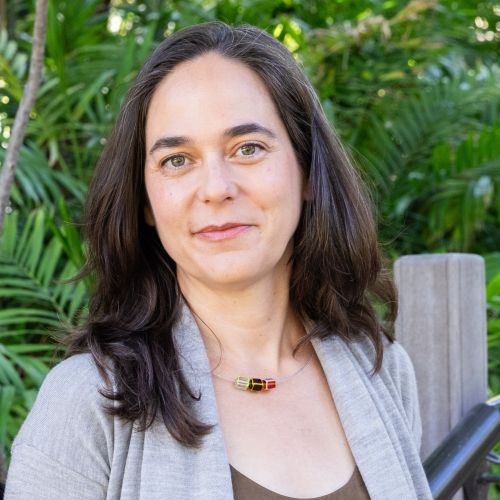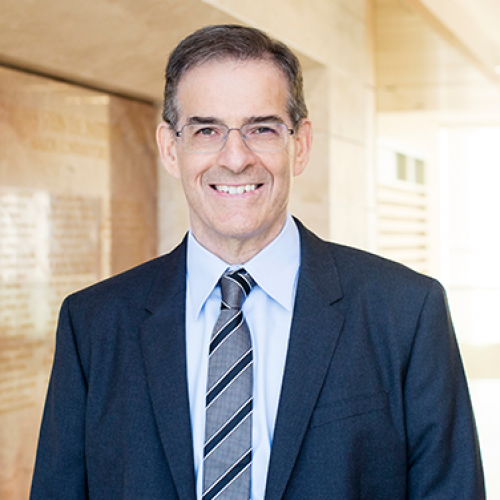Air on the Side of Justice
With her appointment to the newly created Fielding Presidential Chair in Health Equity, Dr. Lara Cushing will illuminate the evidence for and health consequences of social and racial inequalities in harmful environmental exposures.

Growing up an hour north of the U.S.-Mexico border in Tucson, Arizona, in the 1990s afforded Dr. Lara Cushing a vantage point that set her on a trajectory to her current position, as an assistant professor of environmental health sciences and the newly appointed Jonathan and Karin Fielding Presidential Chair in Health Equity at the UCLA Fielding School of Public Health.
The U.S. Border Patrol launched Operation Safeguard in Nogales, Arizona, in 1995, a sharp escalation of border enforcement efforts, just as the newly enacted North American Free Trade Agreement (NAFTA) was taking effect and the peso had been devalued.
“The border became heavily militarized, and it was hard not to see the stark contrast on the other side of the barriers built during my childhood,” Cushing recalls. “At the same time, NAFTA resulted in the development of a lot of industry on the Mexican side of the border — maquiladoras [factories in Mexico run by foreign companies, with no tariffs and lower environmental standards]. All of that was formative in opening my eyes to the connections between environmental health and social justice concerns. And now, as a new parent, that work has become personal as I think about what type of legacy I want to leave for the generations to come.”
At the UCLA Fielding School, where Cushing joined the faculty in 2020, her research focuses on issues of environmental justice, including the evidence for and health consequences of social and racial inequalities in environmental exposures in U.S. communities. “Over the last half-century, we have made progress in many areas in terms of reducing levels of harmful pollution in our air and water,” Cushing says. “But even as overall levels of pollution have gone down, the gaps in exposure experienced by Black, Indigenous, Latinx, Asian, and other communities of color as compared to white communities persist. We have lacked both a coordinated, effective federal response to climate change and a coordinated, effective reckoning with racism in the U.S. To me, these factors are linked and must be studied together to understand how racism produces environmental health disparities and ultimately seek remedies that can jointly advance sustainability and equity goals.”
Using geographic information system mapping and social and environmental epidemiology methods, Cushing has investigated exposures related to oil and gas drilling, the existence of “heat islands” in urban areas, and the cumulative impacts of multiple pollution sources in disadvantaged neighborhoods on reproductive and other health outcomes. She was part of a group that issued a 2021 study showing a higher rate of preterm births among Latina women living near oil and gas wells in south Texas where drillers burn off excess natural gas as part of hydraulic fracturing (fracking) techniques. Her work has also pointed to the disproportionate impact of climate change on low-income populations. Cushing coauthored a recent study projecting that as many as 24,500 affordable housing units in the United States will be exposed to coastal flooding by 2050, triple the number of units at risk only 20 years ago.
Even as overall levels of pollution have gone down, the gaps in exposure experienced by Black, Indigenous, Latinx, Asian, and other communities of color as compared to white communities persist.
Cushing looks to maximize the impact of her work in several ways. She has investigated the racial justice implications of specific environmental programs and has put forth analytical frameworks to assess the cumulative impacts of environmental and social stressors on health in order to sharpen regulatory decision-making around environmental justice. Cushing also partners with community-based organizations to help ensure that her research addresses the most salient questions and that the results are poised to make a difference. “Los Angeles has so many grassroots organizations doing amazing work at the intersection of environmental and racial justice,” Cushing says. “I hope to use this chair to help deepen existing research partnerships and develop new ones that can help to address the sustainability and equity challenges faced by communities in L.A. and beyond.”
The endowed chair was established by Dr. Jonathan Fielding, a national public health leader and distinguished professor-in-residence at UCLA FSPH, and Karin Fielding, also a longtime public health advocate, to support the work of an early-career faculty member who is developing innovative ways to solve persistent health disparities and strengthen the school’s role as a leader in advancing health equity.
The persistent health disparities based on where people live, learn, work, and play — the social determinants of health — can and must be addressed by the next generation of public health leaders, and that is why we deemed it essential, in establishing an endowed chair, that it be devoted to health equity,” Jonathan and Karin Fielding said in a statement about Cushing’s appointment. At the same time, environmental issues, particularly the health effects of climate change, represent an existential threat that we must urgently address through public health research and policy. Lara Cushing’s work at the intersection of the environment and social justice is exactly what this endowment was intended to support, and we are pleased that she will set the standard as the first Fielding Presidential Chair in Health Equity.”
Traditionally in academia, endowed chairs are awarded to senior investigators who have established a long track record. The Jonathan and Karin Fielding Presidential Chair in Health Equity, which carries a five-year term, is unusual in its mission of supporting talented early-career faculty members — providing them with the discretionary funding that can advance work poised to make a major impact on issues of health equity. The University of California provided matching funds for this endowed chair as part of The Presidential Match for Endowed Chairs initiative launched in 2014 by then-President Janet Napolitano to strengthen UC’s efforts to attract top-flight faculty.
“Often, early-career faculty feel pressured to pursue projects that have the best chance for funding rather than taking risks on research that they are most passionate about, and with the potential to have the greatest effect,” says Dr. Ron Brookmeyer, dean and distinguished professor of biostatistics at the UCLA Fielding School of Public Health.
“We are very fortunate to have the support of visionary public health champions in Jonathan and Karin, who understand the value of providing the wherewithal for rising stars such as Lara Cushing to explore questions fundamental to some of the greatest public health challenges of our time.”
Says Cushing: “I feel like I’ve hit the jackpot in terms of dream jobs. And with that I feel I have a responsibility to make sure the resources associated with this endowed chair are put to work making a tangible difference to advance environmental justice and protect the health of communities on the ground.”


